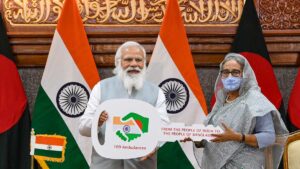Abraham Accord – The Past, Present, and India’s Involvement
2 min read
A 4,000-year-old sibling rivalry originated in the tents of Abraham, when a rift over inheritance divided two sons of the same father. Since then, Ishmael and Isaac have lived at enmity — a historic animosity that made the fact that Arabs and Jews have more commonalities than differences seem ironic to many. Besides their genetic ties, Arabs and Jews have similarities in the language (sharing many of the same words), culture, and faith. Themes of peace — though often more elusive than actualized — are woven throughout the blueprints of Jewish and Islamic consciousness.
The Abraham Accords has become a hot topic for everyone interested in International Relations and Geo Politics. The so-called Abraham Accords signed in the White House on the 15th of September 2020, by the UAE, Bahrain, and Israel under POTUS Donald Trump’s mediation marks a new beginning in the relations between the Sunni ruled Gulf Kingdoms and the Jewish State. Under this agreement, the UAE and Bahrain would ‘normalize’ their ties with Israel, heralding better economic, political, and security arrangements. The Arab nations publicly recognized Israel’s right to exist, and all concerned parties affirmed their joint plans to work together for peace and prosperity from that point forward. This will include opening embassies, commencing commercial air travel and tourism, and instituting mutual economic and other cooperation.
This agreement would soon be followed suit by the support of other Arabic countries and US and Israeli troops. The agreement is already being backed by Saudi Arabia – the most influential Arab Power and a close ally of the UAE and Bahrain.
The Accords is said to be the first agreement between Israel and the Arab countries after the 1994 Jordan Israel Peace treaty and is s aid to be a diplomatic win to Mr. Donald Trump after a series of disastrous decisions undertaken. This also serves to be one of his agendas for his re-elections calling it “the new dawn of a New Middle East”.
Though this agreement is of utmost historical and geopolitical significance, it is very early to say if it will achieve its stated goals. This is because the Gulf countries are not frontline states in the Arab Israeli conflict as they were in the peace treaties of 1979 and 1994 an also this agreement leaves the questions regarding Palestine unanswered.
Geopolitically, India has welcomed the establishment of diplomatic relations between the UAE and Israel, calling both its strategic partners. In general, the Israel-Gulf Cooperation Council (GCC) breakthrough widens the moderate constituency for peaceful resolution of the Palestine dispute, easing India’s diplomatic balancing act.



